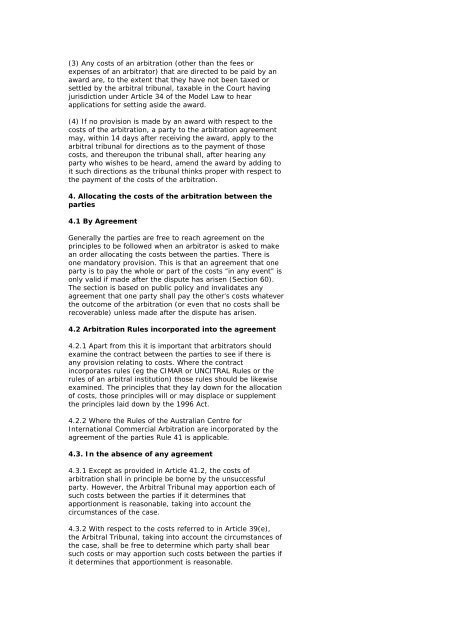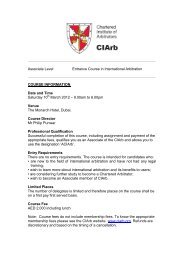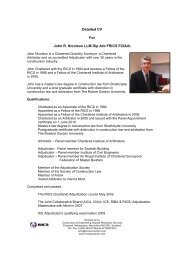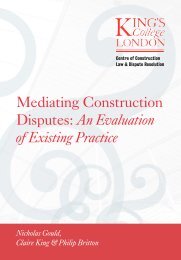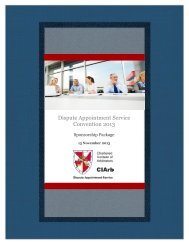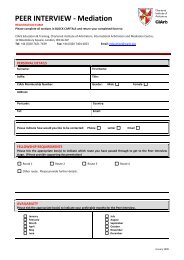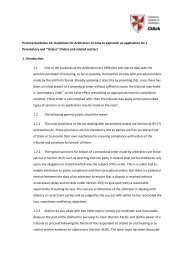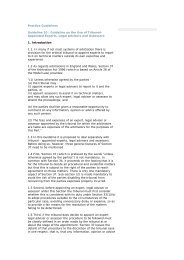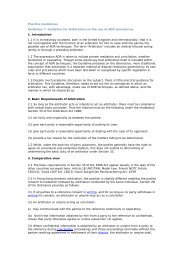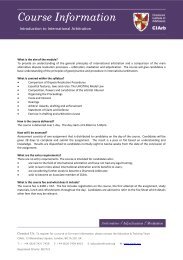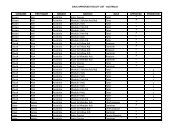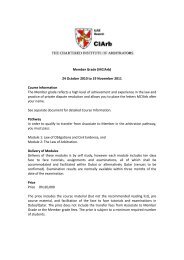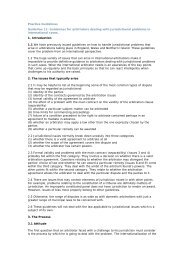Practice Guidelines - CIArb
Practice Guidelines - CIArb
Practice Guidelines - CIArb
Create successful ePaper yourself
Turn your PDF publications into a flip-book with our unique Google optimized e-Paper software.
(3) Any costs of an arbitration (other than the fees or<br />
expenses of an arbitrator) that are directed to be paid by an<br />
award are, to the extent that they have not been taxed or<br />
settled by the arbitral tribunal, taxable in the Court having<br />
jurisdiction under Article 34 of the Model Law to hear<br />
applications for setting aside the award.<br />
(4) If no provision is made by an award with respect to the<br />
costs of the arbitration, a party to the arbitration agreement<br />
may, within 14 days after receiving the award, apply to the<br />
arbitral tribunal for directions as to the payment of those<br />
costs, and thereupon the tribunal shall, after hearing any<br />
party who wishes to be heard, amend the award by adding to<br />
it such directions as the tribunal thinks proper with respect to<br />
the payment of the costs of the arbitration.<br />
4. Allocating the costs of the arbitration between the<br />
parties<br />
4.1 By Agreement<br />
Generally the parties are free to reach agreement on the<br />
principles to be followed when an arbitrator is asked to make<br />
an order allocating the costs between the parties. There is<br />
one mandatory provision. This is that an agreement that one<br />
party is to pay the whole or part of the costs “in any event” is<br />
only valid if made after the dispute has arisen (Section 60).<br />
The section is based on public policy and invalidates any<br />
agreement that one party shall pay the other’s costs whatever<br />
the outcome of the arbitration (or even that no costs shall be<br />
recoverable) unless made after the dispute has arisen.<br />
4.2 Arbitration Rules incorporated into the agreement<br />
4.2.1 Apart from this it is important that arbitrators should<br />
examine the contract between the parties to see if there is<br />
any provision relating to costs. Where the contract<br />
incorporates rules (eg the CIMAR or UNCITRAL Rules or the<br />
rules of an arbitral institution) those rules should be likewise<br />
examined. The principles that they lay down for the allocation<br />
of costs, those principles will or may displace or supplement<br />
the principles laid down by the 1996 Act.<br />
4.2.2 Where the Rules of the Australian Centre for<br />
International Commercial Arbitration are incorporated by the<br />
agreement of the parties Rule 41 is applicable.<br />
4.3. In the absence of any agreement<br />
4.3.1 Except as provided in Article 41.2, the costs of<br />
arbitration shall in principle be borne by the unsuccessful<br />
party. However, the Arbitral Tribunal may apportion each of<br />
such costs between the parties if it determines that<br />
apportionment is reasonable, taking into account the<br />
circumstances of the case.<br />
4.3.2 With respect to the costs referred to in Article 39(e),<br />
the Arbitral Tribunal, taking into account the circumstances of<br />
the case, shall be free to determine which party shall bear<br />
such costs or may apportion such costs between the parties if<br />
it determines that apportionment is reasonable.


